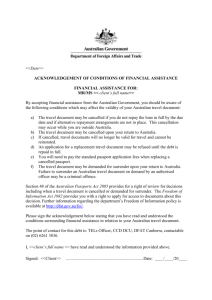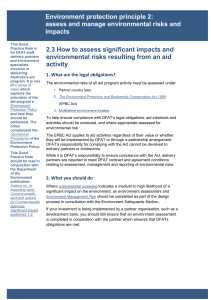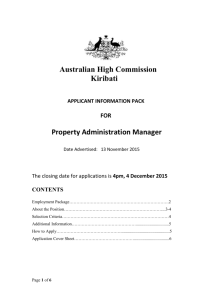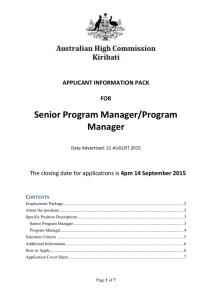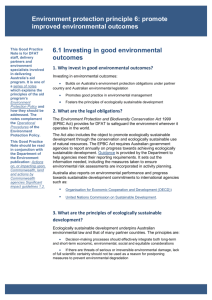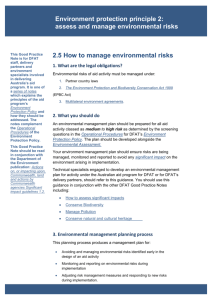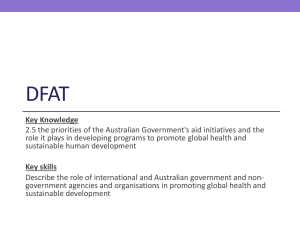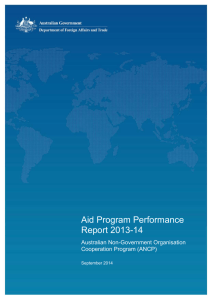10:00 – Meeting Opened - Department of Foreign Affairs and Trade
advertisement
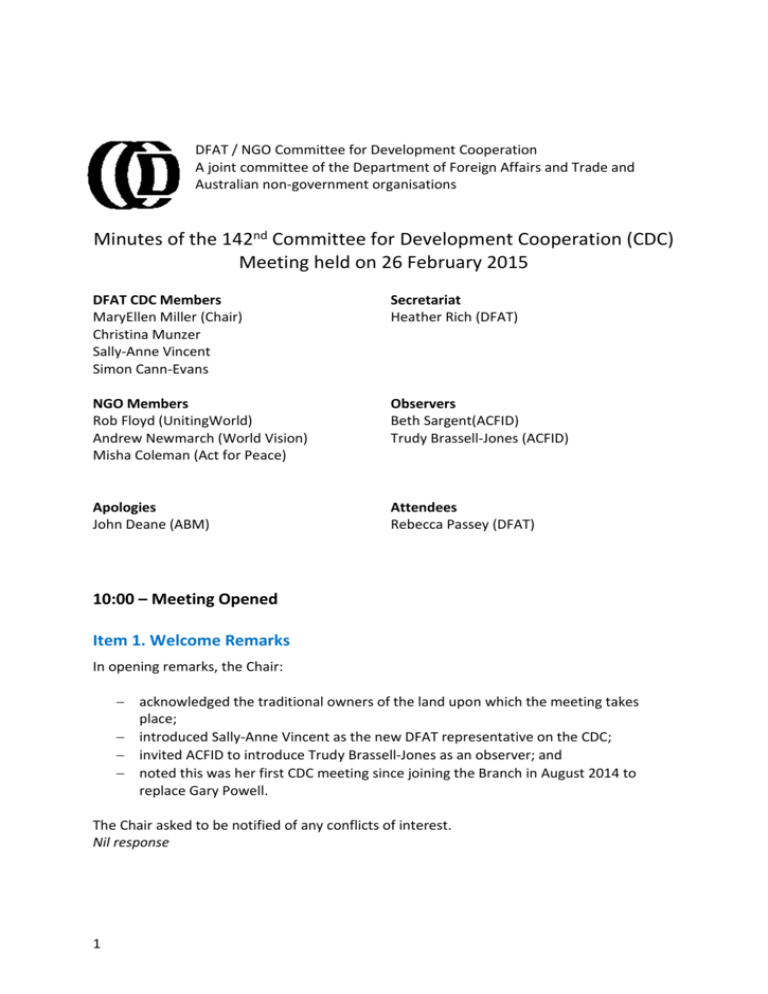
DFAT / NGO Committee for Development Cooperation A joint committee of the Department of Foreign Affairs and Trade and Australian non-government organisations Minutes of the 142nd Committee for Development Cooperation (CDC) Meeting held on 26 February 2015 DFAT CDC Members MaryEllen Miller (Chair) Christina Munzer Sally-Anne Vincent Simon Cann-Evans Secretariat Heather Rich (DFAT) NGO Members Rob Floyd (UnitingWorld) Andrew Newmarch (World Vision) Misha Coleman (Act for Peace) Observers Beth Sargent(ACFID) Trudy Brassell-Jones (ACFID) Apologies John Deane (ABM) Attendees Rebecca Passey (DFAT) 10:00 – Meeting Opened Item 1. Welcome Remarks In opening remarks, the Chair: acknowledged the traditional owners of the land upon which the meeting takes place; introduced Sally-Anne Vincent as the new DFAT representative on the CDC; invited ACFID to introduce Trudy Brassell-Jones as an observer; and noted this was her first CDC meeting since joining the Branch in August 2014 to replace Gary Powell. The Chair asked to be notified of any conflicts of interest. Nil response 1 Item 2. DFAT Updates 2.1 Budget Forecast The Chair noted that Aid Expenditure in the current financial year (2014-15) is unchanged at an estimated $5.032 billion. Spending would be reduced by $3.727 billion over the three years of the forward estimates (2015-16 to 2017-18). Changes to funding allocations to individual programs would be determined by the Minister for Foreign Affairs through the 2015-16 budget process. This includes funding to Australian NGOs through mechanisms such as the ANCP. The Chair advised that DFAT would continue to liaise closely with NGOs and provide advice when possible. DFAT would also endeavour to advise on what principles would be applied in undertaking any funding reductions. The Chair reminded that DFAT was available to hold discussions with any NGOs that may require greater flexibility. 2.2 Civil Society Engagement Framework The Chair noted that DFAT was developing a new framework for engaging with NGOs that would build on the 2012 Civil Society Engagement Framework. DFAT would refresh the CSEF to align with the Government’s new aid policy, Australian aid: promoting prosperity, reducing poverty, enhancing stability, and the performance framework for the aid program, Making Performance Count: enhancing the accountability and effectiveness of Australian aid. The areas of focus for the Foreign Minister were innovation and private sector support. DFAT was currently developing an NGO consultation process with ACFID. Consultations would also be held in DFAT and with other DAC donors. NGO consultation would build on the extensive engagement undertaken for the CSEF NGO consultation opportunities would be advised through ACFID. The framework was expected to be finalised in 2015. ACFID noted they were looking at engaging with DFAT on work they were undertaking on innovation within the NGO sector. 2.3 Staffing Updates [Chair] Julie McCallum was filling the position of Director Volunteers Section while Kerrie Anderson takes long service leave until May. 2 Multilateral Development and Partnership Division Head, Clare Walsh (to whom the NGOs and Volunteers branch reports) would be moving on at the end of March to prepare for her posting as Deputy Head of Mission in Tokyo. ITEM 3 – Endorsement of CDC 141 Minutes The CDC agreed to endorse the 141st Minutes, seconded by Rob Floyd. The CDC requested that Minutes are shared with the CDC two weeks from the meeting. DFAT noted that they we would do their best to meet the timeframe. Item 4. Update on outstanding Action Items 4.1 RDE and ongoing work The Chair introduced Rebecca Passey to speak to the item For ongoing management: RDE reporting was now online and opened up the previous week for NGOs to submit their worksheets. DFAT would hold an RDE Webinar 3 March. The RDE explanatory notes online had also been updated and DFAT were happy to hear any CDC feedback. DFAT provided the CDC a written summary of the changes during the meeting. RDE would be discussed at the Assessors Workshop, to be held the following Monday. The issues around the RDE calculations and funding allocation raised in the 2013 RDE Review remained valid; however in light of the budget forecast and ODE Evaluation, DFAT needed to sequence the implementation of any possible changes to managing RDE. It was likely that in 2015-16 further reviews to RDE and funding allocation models would be required, including more detail on how microfinance was captured. Action DFAT agreed to share the Geoff Simkiss presentation on RDE at the 140th CDC meeting ahead the 143rd meeting scheduled for June. Rob Floyd noted some inconsistencies in OR reports on gifts in kind and RDE reporting that he would like to raise offline with DFAT and review team. 3 4.3 Child Protection Policy Survey The Chair introduced Christina Munzer to speak to the item: An updated Child protection policy was currently being developed by the Risk Management area of DFAT. The analysis of the survey results had been put on hold during the process. Once a new policy is finalised the survey results should also be available. ACFID noted their child protection working group were keen to re-engage DFAT on this policy. 4.4 Terms of reference CDC While the CDC Terms of reference remained current, DFAT proposes that more clarity was given to roles and responsibilities of representatives. As a first step DFAT would hold an offline discussion with ACFID around the role of observers and the secretariat. ITEM 5 –ACCREDITATION POLICY The Chair introduced Heather Rich to speak to the following items: 5.1 Removal of disability support from the Welfare definition DFAT requested the committee reconsider the inclusion of ‘support to the disabled’ in the definition of Welfare provided in the ANCP Manual. The ANCP Manual currently defined welfare as: “care and maintenance, other than in refugee and emergency situations, which aims to maintain people in a particular condition on a longer-term basis”. “Substantial and broad impact on social and economic conditions in the community is not normally expected from welfare programs. Welfare is typically provided to an individual or family basis including home-based and institutional care programs, such as those provided by orphanages, homes for the elderly, hospices, support to the disabled, and the provision of food for those who are destitute.” Development initiatives could be distinguished from non-development (welfare) activities by the presence of: participation, fair distribution and sustainability. Following consultations with CBM and the DFAT disability specialist, DFAT was of the view that support to people with disability, which promoted or resulted in participation, fair distribution and sustainable outcomes, should be considered as development and not welfare. DFAT therefore proposed that ‘support to the disabled’ was removed from the definition. CDC agreed the removal of the term along with the inclusion of the following wording: 4 Exceptions to this may include situations where home-based care leads to inclusion in development and sustainable long-term change. Action The second point in the welfare definition in the ANCP Manual will be updated to read: “Substantial and broad impact on social and economic conditions in the community is not normally expected from welfare programs. Welfare may be provided to an individual or family basis including home-based and institutional care programs, such as those provided orphanages, the elderly, hospices and the provision 5.2 Removal of by OAGDS statushomes from for eligibility criteria of food for those who are destitute. Exceptions to this may include situations where home-based care leads to inclusion in development and sustainable long-term Currently the pre-requisites for accreditation include the requirement to have applicable change.” Deductible Gift Recipient (DGR) status. (Accreditation Manual, page 6). This currently translates to all NGOs needing to have applicable DGR status either through: the Overseas Aid Gift Deduction Scheme (OAGDS) under ITAA 1997 s30-85 Developing Country Relief Fund, or specific listing under ITAA 1997 s30-80 International Affairs – Specific DFAT advised it would remove this as a pre-requisite but it will remain as part of selection criteria as ‘an applicable DGR status if this is claimed by the NGO.’ DFAT advised that majority of NGOs would fall within this criterion and there were no agendas to widen the application field to other organisations not dependent on gift deductibility. CDC supported the clarification that NGOs issuing tax deductible receipts would need the relevant DGR status in order to be accredited. Action The DFAT Accreditation Manual will be updated to reflect clarification in the DGR status. 5.3 Updated Accreditation Manual The Accreditation Manual was finalised in October 2014 and available on the DFAT website. DFAT thanked CDC members that contributed feedback to the manual while it was under draft. 5.4 Accreditation Assessors Workshop DFAT advised an Accreditation Reviewers Workshop would be held 2 March. Topics to discuss included: 5 o o o o o Using the new online system Updates on DFAT policy and guidelines DFAT performance and due diligence guidelines Child Protection and Fraud Policy Development of new Assessors Some CDC representatives would also attend. Members of the review team were collecting feedback on the online system from NGOs and other assessors. This information would be presented and discussed in more detail at the workshop. Action DFAT will share notes from the Assessors workshop with the CDC when they become available. ITEM 6 – ANCP UPDATES 6.1 Office of Development Effectiveness Evaluation of ANCP The Chair invited Christina Munzer to speak to the item: The evaluation remained on track for a final report before the end of the financial year, although there had been small delays in the progress to ensure the ANCP Theory of Change could help inform the evaluation. The final Evaluation Plan and Key Issues Paper was available on the DFAT Website under the ODE current work page. The team was now in the data collection phase and over 80% of ANCP members had participated in an online survey. A number of interviews and focus groups had also been held in Sydney, Melbourne and Canberra. This phase would also involve field visits to Papua New Guinea and Bangladesh where the team would engage with NGOs, Partner Governments and the Posts. ODE expected to be able to share a draft evaluation report with the ACFID DPC by April and had also proposed a joint DFAT and DPC workshop to discuss draft recommendations. CDC members requested that the CDC NGO representatives can take part in the evaluation interviews. Action DFAT will follow up with ODE on matter of NGO representative interviews as part of the evaluation. 6 6.2 ANCP 40th Anniversary The Chair introduced Sarah Gowty from CARE to provide an overview of the event. The ANCP Partners were planning an event to celebrate the 40th Anniversary of the ANCP. The event would involve key figures in the ANCP community including; the Minister for Foreign Affairs, Senior DFAT and NGO staff; staff from embassies in Australia and the private sector. Sarah noted the event would feature a photographic exhibition to be held over 4 weeks at the DFAT Civic and DFAT Barton Foyers. The Chair introduced Heather Fitt to speak to the following items: 6.3 ANCP Theory of Change DFAT received feedback on the final Theory of Change (ToC) document in January. Comments were received from ACFID, nine ANGOs and two sections within DFAT. These comments were extremely valuable and helped to refine the draft and improve its clarity. Following on from this feedback the ANCP M&E team shared a set of summarised comments and the way in which they were addressed in the final ToC. Next steps: are for DFAT to undertake an internal peer review and submit the final Theory of Change for formal DFAT approval. The team will then communicate final ANCP ToC to ANGOs in due course 7 6.4 ANCP Thematic Review – Gender Equality & women’s empowerment The Thematic review was progressing well, with NGO Learning events scheduled for the second week in March: Melbourne - Wednesday 11 March / Sydney - Thursday 12 March. These events would discuss the initial outcomes of the review and would also contribute to the final report. Themes included; organisational commitment to gender equality; programming for gender equality, including accountability mechanisms; local partner approaches; and linking learning. The ANCP M&E team would also provide an update at the DFAT/ACFID Gender working group scheduled on 25 March. There was also a possibility of presenting the Review at the ACFID University Network Conference – 4-5 June 2015. An abstract had been submitted for consideration. 6.5 Annual Performance Reporting Heather Fitt shared the Partner Performance Assessment templates with the CDC and advised that DFAT would be holding a webinar on 31 March. Partner Performance Assessments (PPAs) are the key mechanism in DFAT used to assess and improve the performance of delivery partners implementing Australian aid agreements. PPAs would be completed for commercial suppliers, NGOs and multilateral organisations, except for core funding contributions. DFAT was developing a Frequently Asked Questions (FAQs) and a Ratings Matrix to assist program managers completing Partner Performance Assessments (PPAs). Many of the questions in the FAQs have come from ACFID members and DFAT staff and NGO partners have provided considerable input into the process. To streamline guidance provided to program areas, there have been some changes to the draft document shared with the sector (through ACFID) in February. The Ratings Matrix was adapted to apply to other partner types rather than being for NGOs only; this ensures consistency across partners while also providing for flexibility in thinking about the capacity of partners within the context of the specific agreements. 15:00 Meeting Close 8
